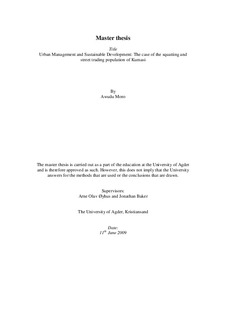| dc.description.abstract | The single most important tool for dealing with the challenges that urbanisation
presents, especially for cities in developing countries, is management or governance.
Urbanisation presents towns and cities and the people who inhabit them with a lot of
challenges not ever seen before in human history. Sad to note however, cities in
developing countries do not seem to be able to take advantage of these opportunities.
They have had to contend with so many challenges that it makes it very difficult for
them to seize fully the opportunities that urbanisation presents. Such problems as filth,
overcrowding, lack of employment, high rate of crime, inadequate housing facilities,
and many others have become the lot of these cities. So the question has often been
asked; what are the appropriate strategies for dealing with these urbanisation-induced
challenges which appear to have dogged the experience of cities in the South for the
greater part of their lives? It is apparent that whatever management strategies that
have so far been employed, have not succeeded in dealing adequately with these
challenges. Thus, instead of management serving as a tool for dealing with these
challenges, it has in itself become a challenge in most cities in the developing world.
Surprisingly, street trading and squatting are two of the biggest challenges facing city
authorities in Kumasi. This paper explores how these problems have been managed
over the years by the authorities. From this the paper tries to draw lessons about how
the problems can be sustainably managed for sustainable development. The Kumasi
Metropolitan Assembly (KMA) which is in charge of managing the city of Kumasi
has oft-been accused of using a non-participatory and confrontational approach in
dealing with these problems. The study found little evidence to show that the city
authorities have in managing these problems adequately involved all major
stakeholders. The irony is that, the KMA is itself an organ of local government and a
decentralised administrative setup which has as its foundation, popular participation
in the process of government.
In the meantime, the UN-HABITAT (2008) calls on governments “to act more
proactively on shifts towards participatory management that help create ownership
over decision-making and daily management practices” because apparently, it has
observed that “state-only” and “market-only” approaches to urban management have
failed. The study finds out that participatory management may be the ideal approach
especially in the face of the many challenges that the confrontational approach used
by the authorities pose to traders, squatters and their families and therefore
recommends that the requisite systems are put in place for the realisation of same.
Concurrently the study also finds that an integrative or inclusionist orientation with a
participatory approach may, given the current prevailing circumstances in Kumasi, be
more idealistic than realistic. This is because, such prerequisites as a united strong
civil society group to participate in the process of negotiation and deliberation is
almost nonexistent. There are also conflicting interests, whose reconciliation will not
be easy at all, but which need, in order for a smooth and healthy collaboration among
all parties, to be reconciled. | en |
